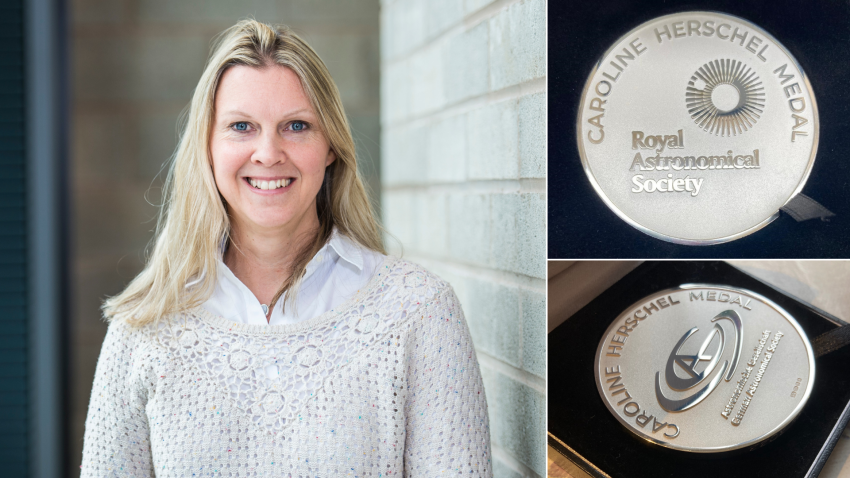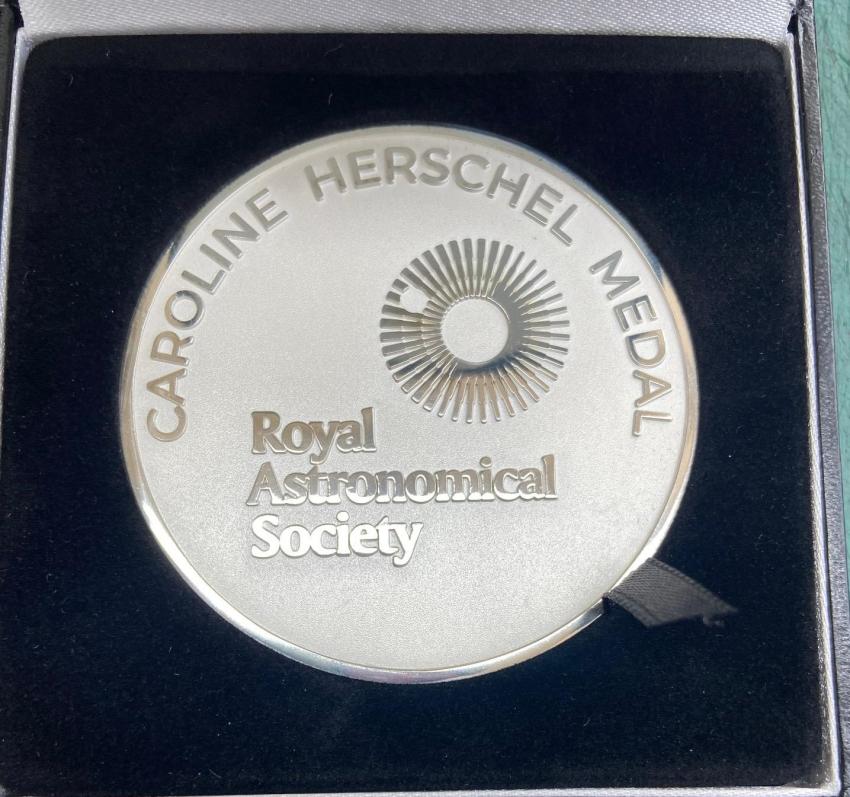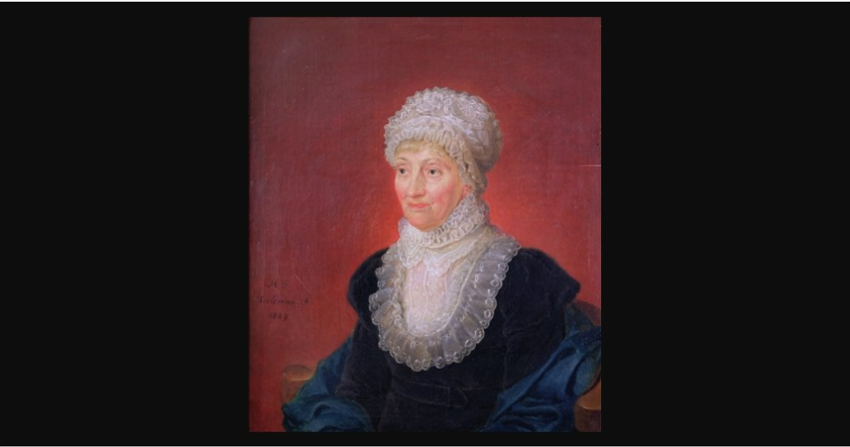A "pioneering" leader in the study of distant supernovae who has had a "profound impact on astronomy" has been awarded the 2025 Caroline Herschel Medal.
Professor Dr Isobel Hook, of Lancaster University, received the honour – which celebrates "exceptional" women astrophysicists in the UK and Germany – in recognition of her outstanding contributions to astrophysics.
She was described by the award panel as a "visionary" in the development of next-generation astronomical facilities, particularly the future Extremely Large Telescope (ELT).
"Her work epitomises the spirit of discovery and excellence celebrated by the Caroline Herschel Medal, honouring her profound impact on astronomy and her enduring legacy in the scientific community," they added.
Professor Hook's involvement with the Gemini Multi-Object Spectrograph (GMOS) has enhanced our ability to probe the faintest and most distant cosmic phenomena, while her contributions to 4MOST, Euclid and the Rubin Observatory advance large-scale surveys of dark energy and galaxy evolution.
She said: "I am thrilled to have been chosen for this award. International collaboration, which the Caroline Herschel Medal celebrates, has been essential to all the projects I have worked on."
The Caroline Herschel Medal – with an accompanying prize of £10,000 supported by the UK Government – is jointly awarded by the Royal Astronomical Society (RAS) and German Astronomical Society (Astronomische Gesellschaft, AG).
It commemorates the legacy of Caroline Herschel, a distinguished astronomer working in the late 18th and the first half of the 19th century who made a number of groundbreaking discoveries, including several comets.
Professor Hook, who was also described as "a dedicated educator and mentor”, was awarded the Caroline Herschel Medal for her leadership in the study of distant supernovae and the accelerating expansion of the universe.
She has been instrumental in advancing the field through her significant roles in major international collaborations.
"I am absolutely thrilled that Isobel Hook is this year's winner of the Caroline Herschel Medal," said RAS President Mike Lockwood.
"This annual prize alternates between a UK-based and a German-based female astrophysicist and the level of achievement of all winners has been extraordinary.
"Isobel maintains that truly exceptional standard. She has authored 180 refereed papers which have garnered over 47,000 citations from other scientists, pioneering studies of the faintest and furthest of the known objects in the universe.
"She also works hard to inspire younger scientists and to make sure they have the instruments and techniques that will make further discoveries, helping to unravel the great mysteries of astronomy and cosmology, such as dark energy."
Professor Stefanie Walch-Gassner, AG President, said: "Prof. Hook's remarkable contributions to astrophysics and her leadership in major international collaborations have profoundly shaped our understanding of the universe. We are honoured to recognise her achievements with the Caroline Herschel Medal."
Professor Hook's involvement in ELT "further strengthens her reputation as a visionary in the development of next-generation astronomical facilities", the award panel said.
They added that as leader of the Lancaster Astrophysics group, Professor Hook "inspires the next generation of astronomers and fosters global scientific collaboration".
It was a babysitter she had when she was young who first got Professor Hook interested in astronomy.
"She showed me books on astronomy and I was amazed by the images of planets, stars and galaxies, but also by the distances and speeds involved," the award-winning astrophysicist said.
In her spare time the married mother-of-two also enjoys swimming, while she and her family love to go snorkelling on holiday.
The Caroline Herschel Medal honours the longstanding scientific cooperation between Germany and the UK, having been launched in 2021 to celebrate outstanding research by women astrophysicists in the two countries.
It is given out in alternate years to researchers based in the UK and Germany.
Professor Hook joins an esteemed group of past recipients, including Dr Linda Tacconi, Professor Gillian Wright and Professor Eva Grebel. The award not only celebrates individual excellence but also underscores the significant role of women in advancing our understanding of the universe.
Born in Hanover in Germany, Caroline Herschel moved to the UK with her brother William, who was the first president of the RAS in 1820.
Not only was Caroline the first woman in Britain to receive a royal pension for astronomy, in 1828 she became the first woman to win the RAS Gold Medal, awarded in recognition of her discovery of eight comets and her work refining and updating star catalogues.
Professor Hook will be awarded the Caroline Herschel Medal 2025 at a ceremony in London on Thursday 13 March.
ENDS
Media contacts
Sam Tonkin
Royal Astronomical Society
Mob: +44 (0)7802 877 700
Dr Janine Fohlmeister
Astronomische Gesellschaft
Tel: +49 331 7499 802
pressofficer@astronomische-gesellschaft.de
Professor Dr Isobel Hook
Lancaster University
Images and captions
Caption: Professor Dr Isobel Hook has been awarded the Caroline Herschel Medal for 2025.
Credit: Jill Jennings
Notes for editors
About the Royal Astronomical Society
The Royal Astronomical Society (RAS), founded in 1820, encourages and promotes the study of astronomy, solar-system science, geophysics and closely related branches of science.
The RAS organises scientific meetings, publishes international research and review journals, recognises outstanding achievements by the award of medals and prizes, maintains an extensive library, supports education through grants and outreach activities and represents UK astronomy nationally and internationally. Its more than 4,000 members (Fellows), a third based overseas, include scientific researchers in universities, observatories and laboratories as well as historians of astronomy and others.
The RAS accepts papers for its journals based on the principle of peer review, in which fellow experts on the editorial boards accept the paper as worth considering. The Society issues press releases based on a similar principle, but the organisations and scientists concerned have overall responsibility for their content.
Keep up with the RAS on X, Facebook, LinkedIn and YouTube.
Download the RAS Supermassive podcast




